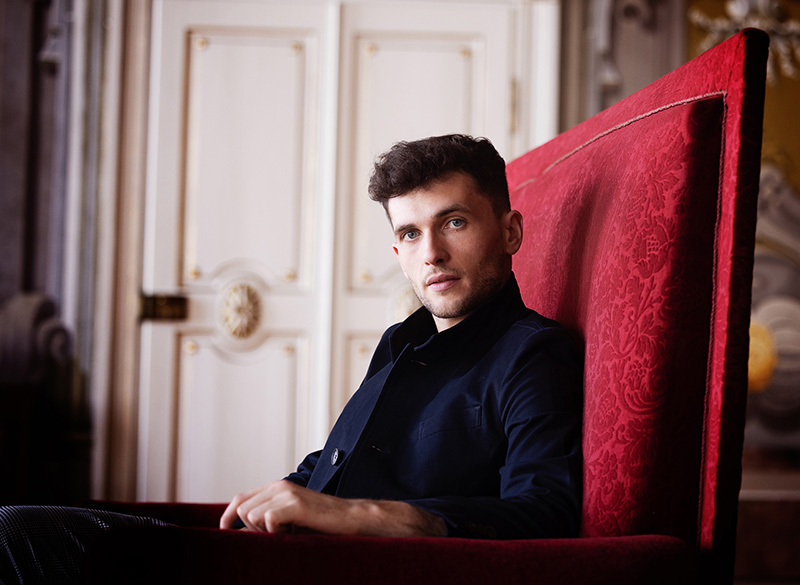Alexandre Baldo
Ensemble Mozaïque | ANTONIO CALDARA - Arias for Bass
“Bass baritone Alexandre Baldo’s performance proved to be a real experience.“
Oberösterreichisches Volksblatt
The Venetian baroque composer Antonio Caldara wrote roughly 3,400 pieces of music in his lifetime. It’s no surprise, then, that there is still a lot of unknown material from Caldara’s oeuvre waiting to be discovered. Young violist and bass baritone Alexandre Baldo has done just that: he has unearthed, and recorded, hitherto unknown bass arias by Caldara.
Caldara composed roughly 87 operas, 32 oratorios, 150 masses, many serenades, motetts, and a 16-voice “Crucifixus,“ as well as about 100 worldly cantatas, 40 madrigals, and over 300 canons and trio sonatas. Born around 350 years ago in Venice, he was one of the most productive composers of his time – and one of the most well-known: he served as the musical director at the court of the duke of Mantua, and in 1716, emperor Karl VI invited him to be vice musical director/Kapellmeister at the Vienna Kaiserhof, where the emperor himself conducted some of Caldara’s operas. Caldara was famous for his skillful combination of Italian, Austrian, and German stylistic elements. In his music, brilliant virtuosity similar to that of his contemporary and fellow Italian Antonio Vivaldi is united with a stricter, technical musical language which is reminiscent of Johann Joseph Fux’s famous work “Gradus ad Parnassum.“ And Johann Mattheson – an equally renown musical theorist – wrote about Caldara that he, just like Händel and Vivaldi, had a “great understanding of human feelings and emotions.“
Alexandre Baldo discovered all these elements in the arias for bass baritone, as well, which he found in the depths of the Austrian national library in Vienna. “The pieces, among them operas, oratorios and serenades, were written during his time as vice Kapellmeister at the Vienna court of the emperor, and were composed between 1716 and 1736, the year he passed. When I was studying the bass parts, I immediately noticed the unusual virtuosity and surprising expressivity which is required by the interpreter.“ And it got even better: many of the arias which Caldara had originally
composed for the popular bass vocalist Christoph Praun fall perfectly into Baldo’s vocal range, too. During additional research, Baldo also noticed that those arias “have, as far as we know, not been performed since their original premieres and have never been recorded.“ Could there be any better reason for a recording? Violist and singer Alexandre Baldo, who is accompanied here by the Ensemble Mozaïque, of which he is a founding member, does not think so.
Alexandre Baldo, winner of the Concorso internazio-nale Musica Sacra 2021 in Rome, also received the 1st prize and the audience award at the Göttingen Händel Competition as soloist of the baroque Ensemble Mozaïque in the same year, and at the Fiori Musicali during the international H. i. F. Biber competition in St. Florian in Austria. Since 2021, he has been singing with Le Concert Spirituel under Hervé Niquet, with whom he gave his debut at the Opéra de Reims in March 2022, in the role of the magician in Jean Baptise Lully’s “Le mariage forcé.“ Additionally, he is a permanent guest at the Ensemble Correspondances under Sébastien Daucé. In October 2022, Baldo sang the bass part of Händel’s Messiah under the direction of Oliver von Dohnányi at the Opava theater (Czech Republic). In January 2023 followed his debut at Brucknerhaus Linz, with the Ensemble Mozaïque and the program “Orpheus am Gänsemarkt,“ which included music by Telemann, Keiser, Kusser and Händel. Alexandre Baldo studied at the University Mozarteum Salzburg with Christoph Strehl and is also a student of Iuciana Serra. In the fall of 2023, Alexandre Baldo will be singing the role of Esculapios from Antonio Sartorio’s “L’Orfeo“ in an opera production directed by Philippe Jaroussky at the Théâtre de l’Athénée in Paris.
